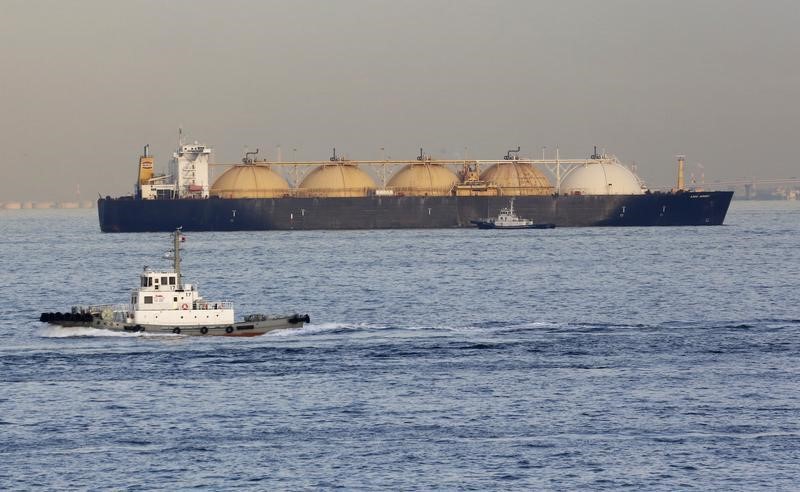By Nina Chestney
LONDON (Reuters) - The decline of Britain's biggest gas storage site and the lack of new-build to replace it will increase dependency on imports over the next few years, boosting wholesale market volatility and consumer gas prices.
Seasonal gas storage provides security and flexibility of supply. At times of low demand and therefore low gas prices in the summer, gas is injected into storage to be kept for when demand rises in the winter.
Rough, the country's only seasonal gas storage site, can usually meet around 10 percent of Britain's peak daily gas demand but is currently capable only of handling 5 percent.
At over 30 years old, the depleted gas field off England's east coast has undergone prolonged outages over the past year due to problems with well pressure; six wells have permanently closed and there are plans to reduce storage capacity.
On Thursday, operator Centrica (L:CNA) said injection operations would not be available before July 1 due to well testing and the age and condition of the assets.
"It is an ageing site - therefore, you would expect increased maintenance. But perhaps not to this extent," said Nick Campbell, risk manager at consultancy Inspired Energy.
"Centrica will need to be 100 percent certain that the wells can return safely, otherwise there would be huge liability if accidents/issues happened at a later date," he added.
Due to run until the early 2020s, Rough's deterioration is a sign it could be retired sooner, some experts say.
"Brexit is coming at a time when UK North Sea gas production is in terminal decline and the main UK storage facility is facing technical issues that will reduce its capacity with a possible extreme outcome, namely total decommissioning," said Thierry Bros at the Oxford Institute for Energy Studies.
Without Rough, Britain would be more vulnerable to winter price shocks. Wholesale prices would have to rise to attract more gas from Norway, Europe or liquefied natural gas (LNG) suppliers, which would have a knock-on effect on consumer prices.
The effects could be compounded by potential changes to energy supply terms with EU countries if Britain leaves the internal energy market when it quits the European Union.
If EU storage sites can be used, winter prices would also be higher due to the cost of transporting gas through the InterconnectorUK pipeline, Bros said.
SIGNS OF AGEING
In a review last year by Britain's Competition and Markets Authority (CMA), Centrica said Rough had outlasted its original design life of 25 years and its reliability would worsen.
"Given the huge sunken costs and the increased winter (price) volatility then one would imagine that Centrica will want to eke out every pound from the facility, therefore one would expect them to push it into the 2020s in some form," Campbell said.
"The elephant in the room is how much capacity will be available," he added.
The level of gas in Rough is around 525 million cubic metres, which would not even cover two days of peak winter demand. Due to an outage stopping injections, that is well below last February's 1.4 billion cubic metres (bcm), Thomson Reuters data shows.
The CMA review said gas imported through interconnectors was not flexible enough to be a good substitute.
"We consider it probable that Rough remains the most flexible source of gas for meeting peak demand and we have not found or received evidence that is not the case," it said.
Britain has seven other gas storage sites but they offer shorter injection and withdrawal times and less stock.
Other storage operators are also struggling to cover their capital costs due to unfavourable market returns. In 2015, utility SSE (L:SSE) decided to mothball a third of the withdrawal capacity at its Hornsea site.
Even with more pipeline supplies and LNG, Rough still matters in case there are flow disruptions.
In 2013, the BBL pipeline, which transports gas from the Netherlands to Britain, shut temporarily and Rough's storage was nearly depleted, sending gas prices soaring.
In 2006, Rough underwent an unplanned outage for more than four months due to a fire, removing more than 80 percent of its working volume. The additional cost for consumers was estimated at 250 million pounds.
WEAK SPREADS
Centrica said in its half-year results statement last July that it had booked a 176 million pound impairment related directly to the capacity reduction at Rough.
The company has spent around 500 million pounds on Rough since buying it in 2003 and will continue to invest in the site to make sure it operates safely, a Centrica spokesman said, declining to disclose the amount of expenditure planned.
Weak demand and the rise of renewable energy have dragged down seasonal spreads across all European gas hubs, with little hope of substantial recovery. As well as sparse new asset investment, operators are unwilling to pay to renew or extend the life of existing assets.
In the case of storage, operators rely on large swings between summer and winter gas prices to make a profit and drive demand for their services.
"Seasonal gas price spreads have fallen to historically low levels because of the high level of flexible supply across Europe. As they remain at these low levels, it creates a challenging outlook for the Rough asset," the Centrica spokesman said.
Seasonal spreads have fallen from up to 50 pence/therm in 2006 to below 5 pence currently. Analysts say 15-20 p/therm would support large-scale storage investment.
